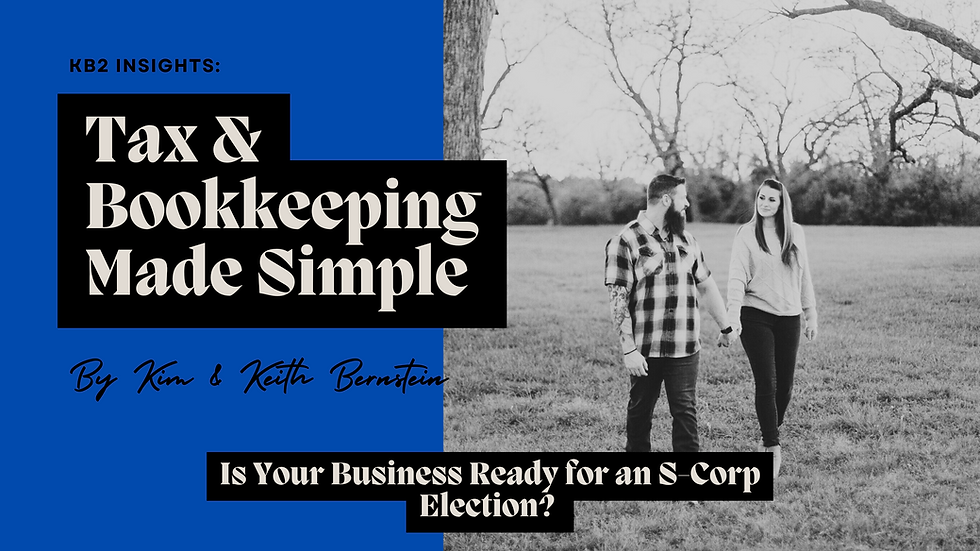Is Your Business Ready for an S-Corp Election?
- Kim Bernstein
- Jul 30, 2025
- 3 min read

So, what is an S-Corp?
An S-Corporation isn’t a type of business entity, it’s a tax election. That means your existing LLC or corporation can choose to be taxed as an S-Corp by filing Form 2553 with the IRS.
The main benefit?
Potential savings on self-employment taxes by splitting your income into:
A reasonable salary (subject to Social Security and Medicare taxes)
Profit distributions (not subject to self-employment tax)
That’s the golden ticket, but only when your business is ready and eligible.
Does Your Business Qualify for S-Corp Status?
To elect S-Corp taxation, your business must meet IRS requirements, including:
Being a domestic corporation or LLC
Having no more than 100 shareholders
Having only one class of stock
Having only eligible shareholders (e.g., individuals, not partnerships, corporations, or nonresident aliens)
When Is the Right Time to Elect S-Corp Status?
S-Corps can be powerful, but they’re not ideal for every business.
You might be ready if:
✅ You’re earning consistent net income
If your business is reliably making $40,000–$50,000+ in net profit, tax savings may outweigh the added cost of compliance.
✅ You’re already paying quarterly taxes
This shows you’re planning for taxes, S-Corps just change how you pay them.
✅ You’re ready to run payroll (even for yourself)
S-Corp owners must pay themselves a reasonable salary via payroll, with W-2s and tax withholdings.
✅ You want to reduce your self-employment tax
As a sole proprietor or single-member LLC, 100% of net profit is subject to self-employment tax. With an S-Corp, only your salary is.
Example: Potential S-Corp Tax Savings
Scenario | Sole Proprietor | S-Corp |
Net Income | $100,000 | $100,000 |
Salary | N/A | $60,000 |
Subject to SE Tax | $100,000 | $60,000 |
SE Tax @ 15.3% | $15,300 | $9,180 |
Tax Savings | — | $6,120 |
This is a simplified illustration. Actual results vary depending on your state, deductions, and overall tax picture.
S-Corp Pros and Cons
Pros
Save significantly on self-employment taxes
Maintain personal liability protection (if LLC or corporation)
Create consistent payroll income for yourself
Boost business credibility with banks and clients
Cons
You must run payroll and file payroll tax returns
You’ll file a separate tax return (Form 1120-S)
The IRS scrutinizes unreasonable salary-to-distribution ratios
More rules and paperwork compared to a sole proprietorship or simple LLC
How Do You Elect S-Corp Status?
Here’s what to do:
File IRS Form 2553
Deadline: March 15 for current year election (calendar year businesses)
Late? You may qualify for late election relief.
Choose your effective date
Wait for IRS approval
Before you begin payroll, wait to receive your IRS acceptance letter (CP261) confirming that your S-Corp election has been approved and stating the effective date of the election.
Start payroll and pay yourself a reasonable salary, based on the approved effective date
Track profit distributions separately from your salary
File Form 1120-S at tax time (and any required state returns)
Bonus: What’s a “Reasonable Salary”?
This trips up many new S-Corp owners.
The IRS requires your salary to be fair and aligned with:
Your role and responsibilities
Your experience and education
Industry averages
Business profits
Set it too low? You could face penalties.
Try our S-Corp Salary Planner to stay in the IRS safe zone.
Final Thoughts
The S-Corp election can be a game-changer for your tax strategy, but only if your business is ready.
If you’re profitable, growing, and want to optimize your taxes, this could be your next smart move.
Ready to Run the Numbers?
KB2 Bookkeeping & Tax can help you:
Review eligibility
File the election
Set up payroll
Handle tax compliance
Disclaimer: This article is for informational purposes only and does not constitute legal or tax advice. Always consult with your qualified tax professional for your specific situation.

.png)



Comments